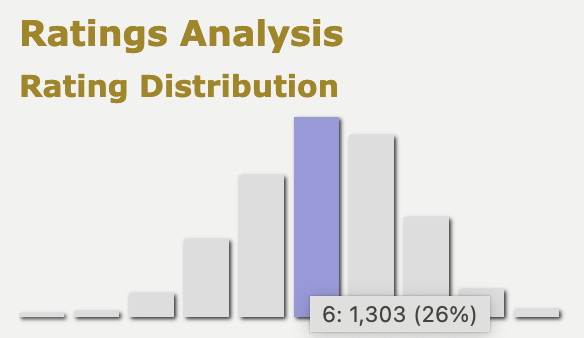Well, it was my first year being an IFComp judge, which feels weird, for having been on the forum almost every day since mid-'19. First judging and reviewing of any comp, as well, but it’s the IFComp scoring that’s pertinent at the moment.
Rather than frame all of this coherently first and write it afterwards, I’m just going to babble.
I think the rubric I used was… sort of close to the standard proposed on the IFComp site? With maybe the caveat that I was treating 10 (and even 9) as a bit too much of a Holy Grail, like rating comp games against games of all time.
I feel like in the end, it’s not as helpful for comparing games to each other within the same comp. As in, if a game was respectable at all, it should get at least a 6 so the author doesn’t get their feelings hurt by seeing their game rated as a 4. But there are a dozen other games rated as a 6 that are distinctly better than this one, which don’t quite feel like a 7.
What I find myself wishing to do, is to set the [perfectly respectable work; no egregious bugs; no egregious typography; author put in the work necessary to make this a functioning playable game] bar at something like a 3, so that the gradations of extra merit are more evident.
One rationale for this is, that how important is it really, to finely grade the exact level of sub-par work? If we presume that every passable effort should start at a 5 or a 6, how important is it really to determine whether an obviously inferior entry gets a 3 or a 2?
On the other hand, if I award a 3 for a game that I consider acceptably made even if not meriting any special attention, I feel like that can have no other effect than to make the author wonder why some judge unjustly trashed their game with an “abysmal” score.
So I find myself wishing one of two things: either that authors could know that “decent work” starts from a 3 and goes up from there, or else I could have those decimals that I talked about, so that if numbers 1-10 are supposed to rate quality as compared to games of all time, I can distinguish the comp games between 5-8 with tenths of a point to indicate which are better than others.
I’ve heard others mention “use all the numbers.” For those that do, where does “decent work” start on that scale for you? Again, my main takeaway is that it feels much less important to me to nitpick about how poorer entries rank against each other, than to have a larger range of comparison for the games with merits. (At first blush, it feels sufficient in my mind to say “1: Game for one reason or another was clearly not comp-ready. Bugs or typography or content was either woefully unrefined/undertested or untasteful. 2: Game had some promise but had clear shortfallings that disqualified it from even an “acceptable/mediocre” ranking. 3: From here on we talk about how far a game rises past basic muster and mediocrity…”)
